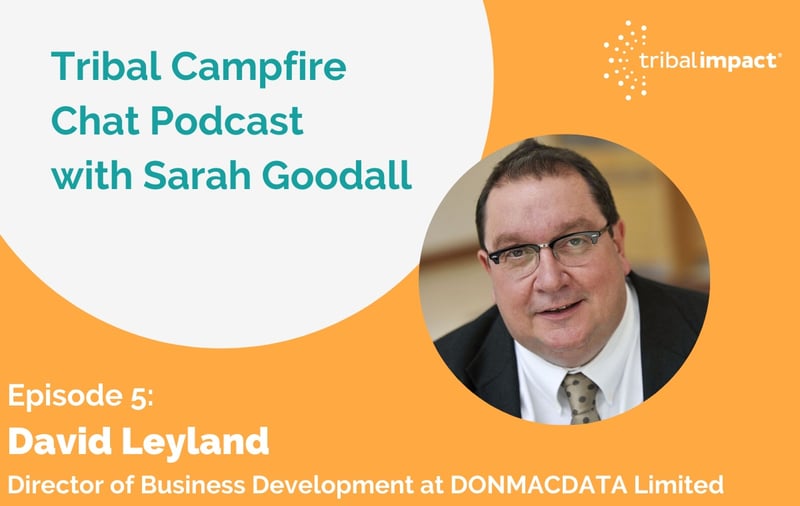
David Leyland: Attracting The Best Fit Customer
Today I'm talking to Dave Leyland. Now, Dave and I go way back. Fresh out of university, I met Dave many years ago when he was the sales director for an IT hardware company. He went on to co-own several businesses and gave me the opportunity to run marketing at one of them. What David doesn’t know about sales just isn’t worth knowing. Since then, Dave’s become a friend, advisor, and a business mentor on my journey at Tribal. Dave, welcome to my campfire chat.
The Age Of Solutions Integration
David himself remembers being a bit of a digital dinosaur in the beginning. One of the people who knew about the technology and sat at the table explaining what it did, to those who were interested in buying. But as he so rightly states, we’ve moved on from that.
This crisis we’re going through now only further backs this up. The world has changed. No longer are we going to all jump on a train, dress up in silly suits and travel all around just to use technology. Time for a better work-life balance.
“Once upon a time we used to smugly sell solutions”, David begins, “because we knew how. And what has changed nowadays is, it's about building. It's not systems integration, it's solutions integration. It's about working on the why. Most of the technology is readily available to us…now it’s about the why, not the how.”
But what kind of impact does that have on the way people do business? Well it’s about moving to the same side of the table. Going from being a vendor supplying something, to being a partner genuinely sitting around the same side of the table, solving a problem. This is the era of business we’re in.
The Remote World Of Work
Culturally and emotionally we have to get over this, David shares. What he’s talking about is the resistance to a remote workforce and working digitally. The idea that just because you can’t see your employees doesn’t mean they’re not working.
Just as much if you can see them, it doesn’t mean they are. If you have the right people on board and are measuring them in the right way i.e. not monitoring what time they clock in, but whether the customers are satisfied. That’s when you’re more likely to succeed.
The one thing David is most keen for people to get their heads around, and do it properly, is securing home working from ransomware, and security breaches. Equipment in homes are not as isolated as they would be offices, so it’s key for employers to pay out now and prevent issues from coming up in the future. And as David points out, it’s much cheaper to buy security software than a train ticket to an office every day, so why put it off?
Uncomplicating A Complicated World
Surprisingly, there are still a lot of sales directors out there who aren't yet understanding the digital world. David recalls some of the best advice he received from his old mentor Alan Fisher, which stands true to this day; don't sell tents, sell camping holidays.
Which in essence, he explains, is not about selling the product; but about selling the outcome of buying the product. So many people and sales directors have lost sight of the point of what they're selling and get too lost in all the details. Focusing on the what, not the why. Often confusing their customers. One of David’s top skills has always been the ability to crystallise and boil things down to the essence. To focus on the why, not the how.
This is what sales leaders need to remember to do. Because when people stop understanding, get lost in a complicated language they don’t understand, they stop buying. Sales teams need to help people understand conceptually what it is you're going to do for them.
Clarity In Business
David’s advice for surviving in any time of crisis like this is clear: focus and clarity. It's about working out exactly what it is you're going to do and focus on just doing that. Not getting distracted by the thousand things that will distract you. Great advice, and he elaborates further on this.
“Be focused. You've got a brilliant idea. You know exactly where you're headed with it. Believe it. Just believe it in your bones and go with it. Because you're going to go through the bleak days when you're going to worry about cash flow. And you're going to worry about whether Fred's order comes through on Thursday. All the things that happen in business. But the principle that has to underpin all of it is just being utterly, utterly focused and being clear and testing, with people that you trust and believe in.”
He continues with more advice:
“If people say no, don't ignore them out of arrogance, understand why they're telling you no…if you look at the really successful people…they are absolutely wedded to an idea that they have pursued really superbly, and that's often what it takes…it’s down to clarity, focus, attention to detail, and just having the motivation and drive to deal with the problems as they come up. And assume you'll get through them. Because you will.”
Attracting The Best Fit
Something David and Sarah agree on whole heartily is about working with the right people. Tribal is all about this. Knowing customers are only people and that we have to approach business with a bit of humility and a bit of humour. Because ultimately, it's about trying to get a clearly defined outcome completed to the satisfaction of both parties. It's not a winners and losers game. It has to be right for everybody.
There will always be companies you can't work with, but the ones that do get your ethos will save you hours of wasted time. Like any human relationship, you want to attract your best fit customer because it’s going to be the most enjoyable and successful venture for both parties.
When people reach out randomly with 'cold' messages or with no genuine intention to help others, nobody's going to want to do business with them. That age of going through the yellow pages and ringing up everyone in there to reach a quota is long gone. It’s bad digital practice now in the online sales world. Examine the quality, not quantity.
It's not the lazy salesperson that is doing four calls a day, but the well-researched, tried to find out all the background, bothered to make an alignment between their proposal and their perceived need of the client salesperson that is going to succeed.
Advice From The Heart
Follow your heart. Be an astronaut? David answers in jest to a question on advice, but his real answer is that it’s about being there to help and counsel those who are younger. To mentor them and guide, so they don't make all the same mistakes.
Though he does wish he had thought more, instead of always thinking so logically, and thinking he knew the answer. To pull up a cup of coffee and sit down for an hour, empty the mind and think more clearly about things. As well as admitting when things need to be restarted, to share ideas with others.
To take a moment, where it’s about slowing down to go faster.
The Episode
[00:25] Meet Dave Leyland
[01:16] Change in the Sales Industry
[06:55] The Cultural Change in the Workforce
[09:44] Understanding the Digital World
[15:37] Finding Focus and Clarity
[19:00] The Best Fit Customer
[23:37] Some Heartfelt Advice
Additional Resources
- David on Linkedin

